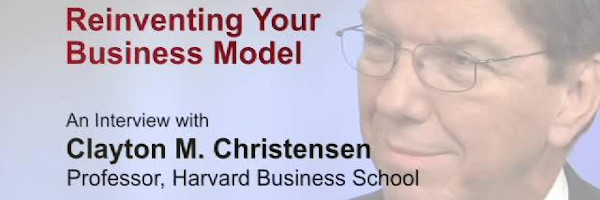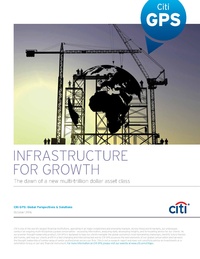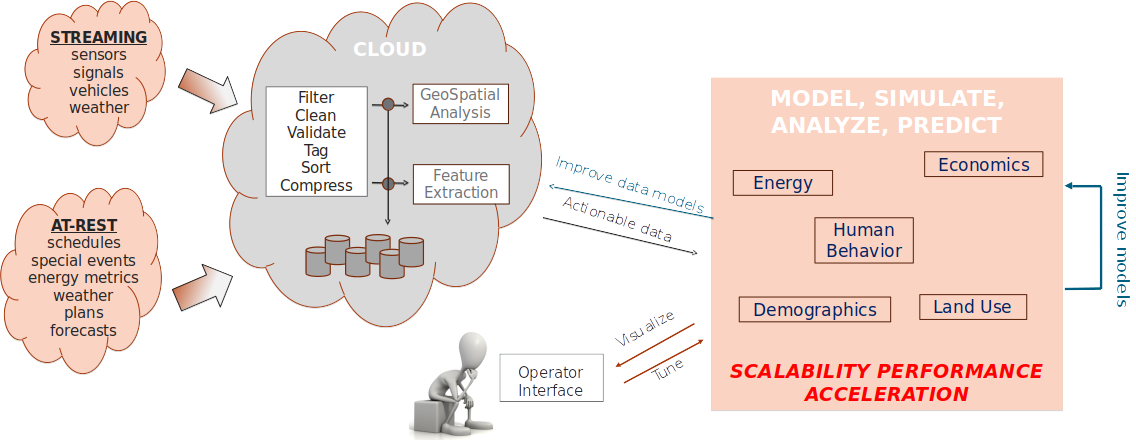Business Models
| Introduction | |
|---|---|

| |
| Sectors | Introduction |
| Contact | Wilfred Pinfold |
| Topics | |
- Authors
In October of 2016, Citigroup released a report INFRASTRUCTURE FOR GROWTH The dawn of a new multi-trillion dollar asset class estimating that the global market for infrastructure investments will reach $59 trillion within the next fifteen years. The report observed that transportation infrastructure would account for a large portion of this market. Cities that are able to establish themselves as viable “living laboratories” where new infrastructure and technologies can be deployed and tested will capture a larger portion of this economic pie.
Open architectures and interoperability among different technologies will be essential to ensuring this economic opportunity is accessible to companies at a variety of stages and sizes. Similarly, enabling open access to certain data will enable companies to develop technology solutions that utilize and deliver this data to constituents and other companies in engaging and innovative ways. Aside from access to a large global market and open technology infrastructure, creating opportunities for talent development will be important to ensure economic opportunity is broadly distributed within the Portland region. Hack Oregon is a local nonprofit that provides training opportunities for people interested in learning how to develop software and work with data to address civic challenges. Hack Oregon has already successfully worked with the City of Portland on open data projects and will be a key partner in developing transportation-related data solutions while training local talent.
The realization of the potential benefits of AVs, in terms of the impact on transportation access, equity, congestion and pollution reduction and safety is likely to hinge directly on important public policies set or controlled by local and state governments. In particular, how vehicles are licensed and taxed and how roads are financed will be critical. It is clear that the existing fuel tax and vehicle registration fees will not provide sufficient funding or the correct incentives for optimal deployment of AVs.
In addition, city parking policy can play a key role in encouraging the development and use of AV fleets. Pricing strategies for parking can encourage households to reduce or eliminate the number of cars they own, and to rely more heavily on other modes of transportation, including transit, bikes, walking and ride-hailed vehicles. Smart parking policies that adjust parking rates in real time can be an important complement to AVs.
Impresa and City Observatory have extensively explored urban transportation policy and the role of AVs. We have also written about the economics of AVs and how public policy, especially road pricing and parking policies, is likely to influence AV adoption. Impresa regularly communicates with colleagues at the Brookings Institution, major providers of parking and traffic data, leading ride-hailing firms, and other institutions studying AV employment.
City Observatory is a virtual think tank on urban policy founded with support from the John S. and James L. Knight Foundation. Impresa is an economic consulting firm based in Portland, specializing in economic development, transportation and housing policy.
Community Engagement
The policy outcomes that are most important to cities as being safety, equity, climate impacts, job creation and congestion relief. Moreover, the City has expressed that the Smart Autonomous Vehicles Initiative (SAVI) initiative must spur innovation and guide the Smart Autonomous emerging technology to serve community goals and, in particular to benefit low and moderate income Portlanders. This emphasis on equity and inclusion is what makes Portland unique as a City. Toward these ends SERA/Civic Ecology Institute proposes to conduct a series of Civic Ecology workshops in target communities that will enable technology experts and citizens to engage in designing future smart autonomous systems that are accessible to a variety of come levels in these target communities. These systems could include such ideas as accessible deployment technologies through training on mobile device and communication networks, small business entrepreneurial opportunities, integration of charging stations into community fabric, integration with bicycle, transit and other existing mobility systems and a host of other equity building ideas. These systems and relationships will then be broken down into specific project and policy initiatives that can be undertaken in collaboration with the community, the City and technology vendors through a Civic Public-Private partnership (CP3). The process will yield a co-created vision for deployment that is shared by the community, the City and vendors, a statement of shared values, systems conceived to achieve the vision, specific projects and metrics by which to measure successful deployment.
Urban Form
As part of the above process, SERA/Civic Ecology institute will advise on the impacts of deploying this emerging technology on future urban form in these target communities. Such questions as how do we rethink transportation corridors, intersections, vehicle pick-ups/drop-offs, the interaction with existing and future transit stations, stops and lines, and other aspects of the public environment to ensure equitable pedestrian access and comfort? Longer term, what might be the impact on community form if there is less of a need for parking facilities? How to redevelop surface parking lots? How to repurpose existing structured parking in a sustainable way? Do these redevelopment opportunities offer possibilities for neighborhood densification of housing and employment, thus reducing pressure to expand the urban growth boundary? Any of these issues are central to the mission of Prosper Portland and its Neighborhood Prosperity Initiative suggesting that target deployment areas should coincide with these Prosper Portland neighborhoods. SERA/Civic Ecology Institute will address these issues in the above described workshops in order to provide a coherent understanding of all of these issues which the City has expressed are of great concern if the emerging technology is going to contribute to a prosperous, equitable City.
Modeling
Predictive modeling software provides the tools needed to manage the city as events unfold, from unexpected traffic jams and sudden rainstorms. Improving parking and traffic; effectively managing energy in schools, buildings and street lights; increasing the efficiency of waste collection and water management; as well as improving citizen services, such as information about public transit and shopping.
Transit oriented design can help by reducing private cars as much as possible and encouraging the use of public transport and bicycles. The platforms time horizons are limited to real-time, near-term, or long-term leaving operators and city planners blind to the consequences of their actions at different time-scale with devastating consequences given the cost of mis-directed transportation decisions.













